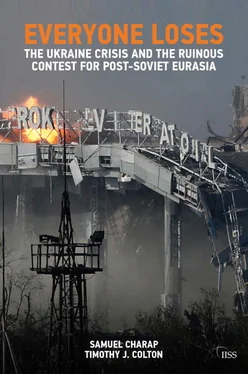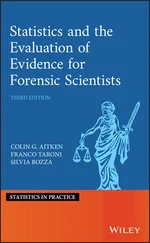All three leadership changes facilitated the ‘reset’ in US–Russia relations and the improvement in Russia–Europe relations in 2009–12. There was some positive spillover into West–Russia interaction in post-Soviet Eurasia. The US facility at Kyrgyzstan’s Manas airport, a stopping point for US soldiers and materiel on the way to Afghanistan, was a good example. In February 2009, Russia offered US$2 billion in assistance to Bakiev, Kyrgyzstan’s strongman, in return for evicting the US from Manas. Toward the end of its time in office, the Bush administration had treated the basing arrangements as an exclusively bilateral issue with the Kyrgyzstanis, which had led Moscow to conclude that the US intended to stay there indeterminately and/or to use Manas as part of a strategy to encircle Russia. Rather than trying to outbid Moscow, the Obama administration sought Russian buy-in. As Michael McFaul, architect of the reset who served as senior director for Russia on the National Security Council staff from Obama’s inauguration until he became ambassador to Moscow in November 2011, recalled, Obama used his first meeting with Medvedev to make clear that he did not care to engage in zero-sum rivalry in the region: ‘He said, “Help me understand[,] President Medvedev[,] why you want us to leave Manas. [B]ecause what are our soldiers doing? They are flying into Afghanistan after a short amount of time in Kyrgyzstan and they are fighting people that if we weren’t fighting them you would have to be fighting them.”’ [74] Michael McFaul, ‘The Russian Economy and US–Russia Relations’, Event Transcript, Peterson Institute for International Economics, 15 April 2011, https://piie.com/publications/papers/transcript-20110415mcfaul.pdf .
Medvedev responded positively, and not only stopped attempts to dislodge the US from Manas but agreed to shipments across Russia by rail for materiel needed by American forces in Afghanistan and even to military overflights for getting troops to the theatre. This route via Russia to Afghanistan would prove indispensable when Pakistan barred the US from using the Khyber Pass following the raid that killed Osama bin Laden.
When Kyrgyzstan descended into anarchy after Bakiev was ousted by angry crowds in April 2010, most observers assumed that Moscow had orchestrated the unrest as revenge for Bakiev reneging on a promise to shut down the base. But instead of indulging in zero-sum games as usual, Russia and the US worked in concert, pursuing back-channel talks that facilitated Bakiev’s safe escape into exile in Belarus. Consultations between Moscow and Washington not only prevented conflict between them – in the one country where both had military outposts – but also led to the coordination of humanitarian assistance. Obama and Medvedev went so far as to issue a joint statement on Kyrgyzstan in June 2010. [75] ‘Joint Statement of the Presidents of the United States and the Russian Federation in Connection with the Situation in the Kyrgyz Republic’, 24 June 2010, https://www.whitehouse.gov/sites/default/files/us-russia_joint_statement_on_kyrgyzstan.pdf .
Kyrgyzstan was an easy case – it is small, remote and impoverished, a non-candidate for NATO or EU integration – but US–Russia comity following political unrest in the region was extraordinary nonetheless.
The EU and Russia had their own reset of sorts in this period, leading to a new framework called the Partnership for Modernization in 2010. Even the NATO–Russia Council came to life, with collaboration on concrete issues ranging from Afghanistan to theatre missile defence. Medvedev attended the Lisbon NATO summit in November 2010 to hold a leader-level meeting of the Council. The 29 heads of state and government issued a statement that ‘we have embarked on a new stage of cooperation towards a true strategic partnership’. [76] ‘NATO–Russia Council Joint Statement at the Meeting of the NATO–Russia Council Held in Lisbon on 20 November 2010’, 20 November 2010, http://www.nato.int/cps/en/natohq/news_68871.htm .
The atmospherics of Russia’s relations with the West were significantly better than they had been in the wake of the 2008 war. As Vyacheslav Nikonov, a hawkish foreign-policy analyst and government adviser, said, ‘The overall climate is better than it has been since the time of perestroika.’ [77] Nikonov quoted in Gregory L. White, ‘In Secret Report, Russia Shifts Westward’, Wall Street Journal , 12 May 2010, http://www.wsj.com/articles/SB10001424052748703565804575238291897667152 .
But the fundamental conflict relating to the region had not been addressed and therefore remained a landmine that could detonate at any time if activated. As one of us wrote at the time, ‘the current pause in unconstructive US–Russia rivalry in post-Soviet Eurasia is highly contingent and unlikely to be sustained by inertia’. [78] Samuel Charap and Mikhail Troitskiy, ‘U.S.–Russia Relations in Post-Soviet Eurasia: Transcending the Zero-Sum Game’, Working Group on the Future of US–Russia Relations, September 2011, p. 19, https://futureofusrussiarelations.files.wordpress.com/2013/01/us-russiafuture_working_group_paper_1.pdf .
Even during this more relaxed period, no tangible progress was made on dealing with the problem at its roots.
Russia did try to begin a conversation on the subject. Speaking in Berlin in June 2008, Medvedev proposed negotiations on a new European security treaty. He elaborated on what its general contents might be in a speech in France in October 2008, after the August war:
The events in the Caucasus have only confirmed how absolutely right the concept of a new European security treaty is today. It would give us every possibility of building an integrated and solid system of comprehensive security. This system should be equal for all states – without isolating anyone and without zones with different levels of security. It should consolidate the Euro-Atlantic region as a whole on the basis of uniform rules of the game. [79] ‘Vystuplenie na Konferentsii po voprosam mirovoi politiki’, 8 October 2008, http://kremlin.ru/events/president/transcripts/1659 .
Harking back to Gorbachev’s ‘common European home’, he emphasised the concept of ‘indivisibility of security’ that was a cornerstone of the 1990 Charter of Paris.
At the same time, Medvedev was also articulating a starkly divergent foreign-policy priority. Moscow, he said, had demarcated its neighbourhood as ‘a traditional sphere of Russian interests’. [80] ‘Stenograficheskii otchet o vstreche s uchastnikami mezhdunarodnogo kluba “Valdai”’, 12 September 2008, http://kremlin.ru/events/president/transcripts/1383 .
‘For Russia, as for other countries, there are regions in which it has privileged interests.’ [81] ‘Interv’yu Dmitriya Medvedeva rossiiskim telekanalam’, 31 August 2008, http://kremlin.ru/events/president/news/1276 .
The geo-idea was clear: Russia has a natural right to pre-eminence in its proximate environs. The problem is that if Russia has a sphere, the countries in it have to be insecure (or spoken for) in order for Russia to be secure, which would suggest that security is divisible after all. Medvedev’s use of the phrase, particularly after the war with Georgia, set off sirens in the region and the West. US Vice President Joe Biden felt the need to rebut it in his speech that launched the US–Russia reset: ‘We will not recognize any nation having a sphere of influence.’ [82] ‘Remarks by Vice President Biden at 45th Munich Conference on Security Policy’, 7 February 2009, https://www.whitehouse.gov/the-press-office/remarks-vice-president-biden-45th-munich-conference-security-policy .
Читать дальше











